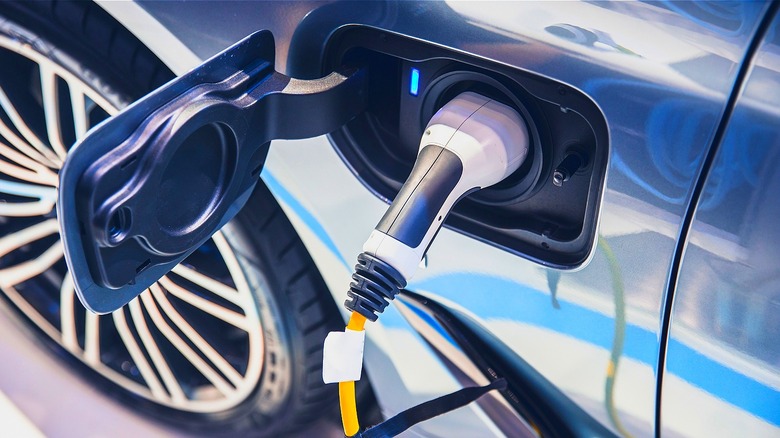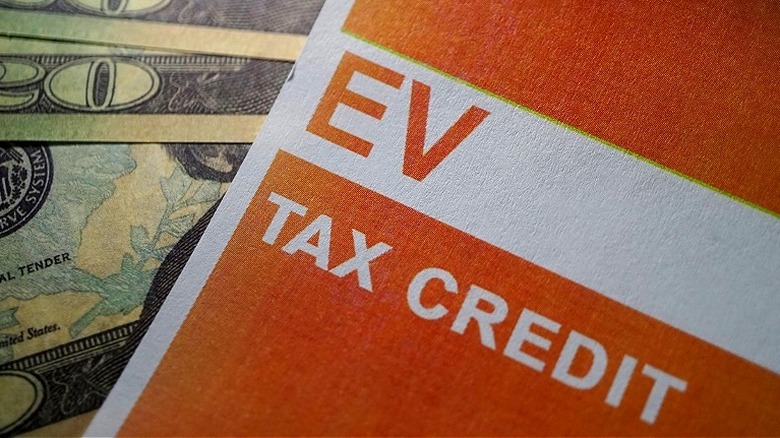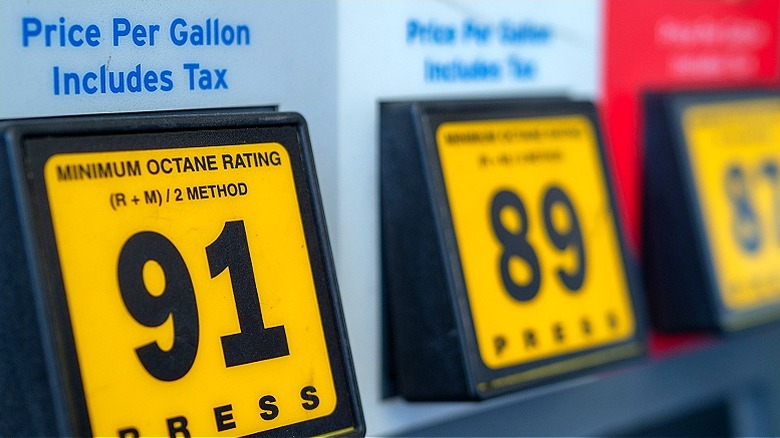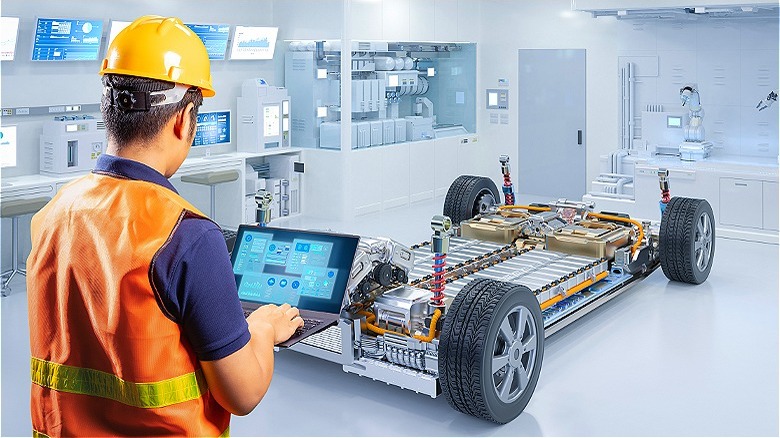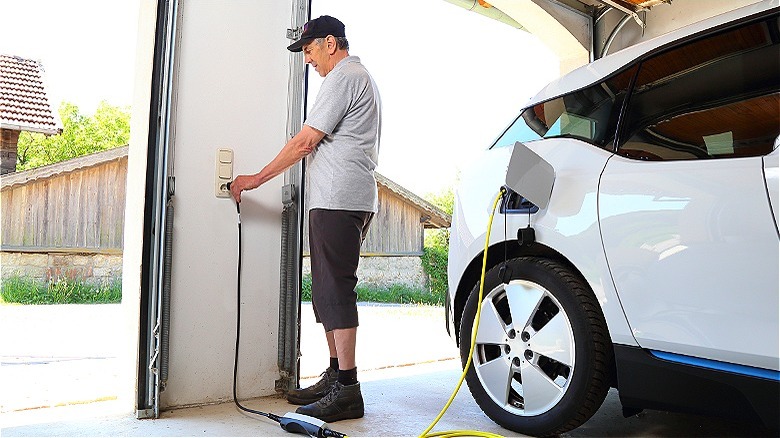Does An Electric Car Really Save You Money In The Long Run?
When discussing electric vehicles with friends and family, prepare for a lively discussion with several opposing viewpoints. For example, many EV proponents tout the technology's positive impact on the environment due to its zero tailpipe emissions. That's in contrast to critics who retort that the manufacturing of EV batteries creates pollution, as well as the fact that the electricity necessary for charging is frequently generated by using fossil fuels.
Money Digest isn't going to take sides or even slightly wade into that complex debate. Instead, let's take a look at the attractiveness of EVs from a purely financial standpoint. With many early adopters having already purchased electric vehicles, there's been a sales slump of late as a portion of the general public remains unconvinced of the practicality and financial benefits of EV ownership. Are they correct to be skeptical of the latter?
Like with so many aspects of personal finance, there's really no one-size-fits-all recommendation as to whether an EV will save you money over the long run. Certainly, not having to strategize over purchasing gasoline is a serious draw, but other factors of EV ownership, like high initial cost and more expensive insurance, narrows the savings gap.
The initial purchase price is typically higher
According to Kelley Blue Book, the average purchase price for a new car in December 2023 was $48,759. When luxury vehicles are removed from the equation, the average price of a new car falls to $45,283. Over the course of 2023, the price of all-electric vehicles fell approximately 18%, also per Kelley Blue Book. Experts cite a price war between Tesla and rival EV manufacturers for these aggressive price cuts that benefit consumers. Still, the average price of an EV — many of which are luxury models — was $50,798 in December 2023. That's approximately $2,000 more expensive than an internal combustion engine (ICE) vehicle.
To help level the playing field, federal tax credits that offer up to a $7,500 rebate are available to eligible buyers on certain all-electric vehicles. Though due to stricter regulations on battery sourcing that started January 1, 2024, less than a dozen electric vehicles qualify for the full $7,500 rebate. On a positive note, buyers and vehicles that do qualify will now receive the rebate immediately at the time of sale, rather than waiting until filing their income taxes to collect. Note that besides the federal incentives, many states offer their own EV rebates as well, so it's worth investigating the policies of your home state regarding qualifying models and income restrictions.
You'll save money on fuel
To be sure, the cost of "fuel" is one area where EVs almost always reign supreme versus their gasoline-guzzling counterparts. Though exactly how much can vary greatly depending on the particular EV, as well as where you live in the United States. For example, electricity in certain New England states like Massachusetts and Connecticut is more than twice as expensive as in some rural areas like Arkansas and Idaho, according to ElectricChoice.com.
The size and characteristics of a particular electric car will also have an effect on efficiency, just as with ICE vehicles. For instance, a 9,000-pound GMC Hummer EV is going to travel a shorter distance on each kilowatt-hours (kWh) than a class leader in efficiency like the Hyundai Ioniq 6. However, on average, an electrical vehicle costs about half as much to drive the same distance as a comparable ICE vehicle, according to the U.S. Department of Energy. In 2022, that organization declared that, "Using national averages, EV drivers pay $1.22 to drive the same distance a conventional car could go on a gallon of gasoline."
A 2020 study published in the Cell Press peer-reviewed scientific journal Joule broke down the lifetime fuel savings of EV ownership by state and discovered that Washington EV drivers can expect to save up to $14,480 during their ownership tenure. While that's exceptional, the national average savings was still a very respectable $7,758 over the lifetime of the vehicle. Note that in a certain few areas, like Hawaii, high charging costs actually made owning an electric car more expensive, though that scenario is rare.
Maintenance costs are lower
It's a misconception that electric vehicles are entirely maintenance-free, but they do have fewer maintenance requirements than their internal-combustion counterparts, to be sure. Typical tasks like engine oil changes and consumables like radiator hoses and spark plugs are a thing of the past with EVs. In particular, while EVs do have traditional braking components like pads and rotors, the replacement intervals are less frequent than with ICE vehicles. That's because an EV converts the energy from braking to charge the vehicle's battery, which reduces load on the actual brake pads.
The one area where EV owners may experience a larger maintenance expense is tires. That's because all-electric vehicles are typically heavier than ICE vehicles, so their tires wear at a faster rate — approximately 20% faster than gasoline vehicles, per Kelley Blue Book. Additionally, the tires require more robust construction to withstand the extra weight of EV battery packs. Lastly, certain EV-specific tires — like those designed for Tesla cars and SUVs — have sound-deadening material inside. Because EVs are so much quieter than ICE vehicles, even a minor amount of tire noise is audible to occupants.
Still, even with heightened tire costs taken into account, experts profess that all-electric vehicles cost about 50% less to maintain as ICE vehicles.
Insurance could be more expensive
Based on the factors discussed so far, it's looking like the long-term ownership costs of EVs are lower than gas-powered vehicles in many instances. However, insurance isn't something that's likely to cost less. Insurance for electric cars has a reputation for being pricey for several reasons. To begin, EVs are often more expensive to purchase than ICE vehicles because of the greater level of technology. Similarly, EVs can be more expensive to repair if involved in a crash.
According to insurance provider Progressive, an EV battery costs anywhere from $4,000 up to $20,000 if damaged in a collision. Repairs are further complicated by the fact that not as many repair shops exist that are trained or equipped to work on EVs. However, both of those obstacles are likely to diminish as time passes. For instance, it's been said that the cost of an EV battery has already fallen almost 90% between the years 2008 and 2022, and technology promises that trend will continue. As well, it only stands to reason that as the number of electric vehicles on the road increases going forward, more shops will invest in the ability to repair them.
Charging at home is a big determinant
At the risk of evading the titular question, driving an electric car can definitely save its owner money over the long run under the right circumstances. Though at the same time, certain variables prevent that from being a blanket statement. For example, residents of states with high gasoline costs and low electricity rates will see the most savings.
As well, EV ownership may be best-suited to homeowners for the time being. Apartment dwellers or other drivers that park on the street may be forced to charge their vehicles at public chargers, which operate at a profit. Regular public charging can get pricey, as well as requiring waiting. Home charging simply requires paying your normal electric bill, although an initial investment for the equipment and installation will be necessary.
You'll also want to research the make and model you're interested in and whether that vehicle will qualify for tax credits or other incentives, either at a federal or state level. Finally, new EVs are typically more expensive than new ICE vehicles and taking out a long-term and/or high-interest rate loan to buy one might cost more than you're actually saving on fuel.
